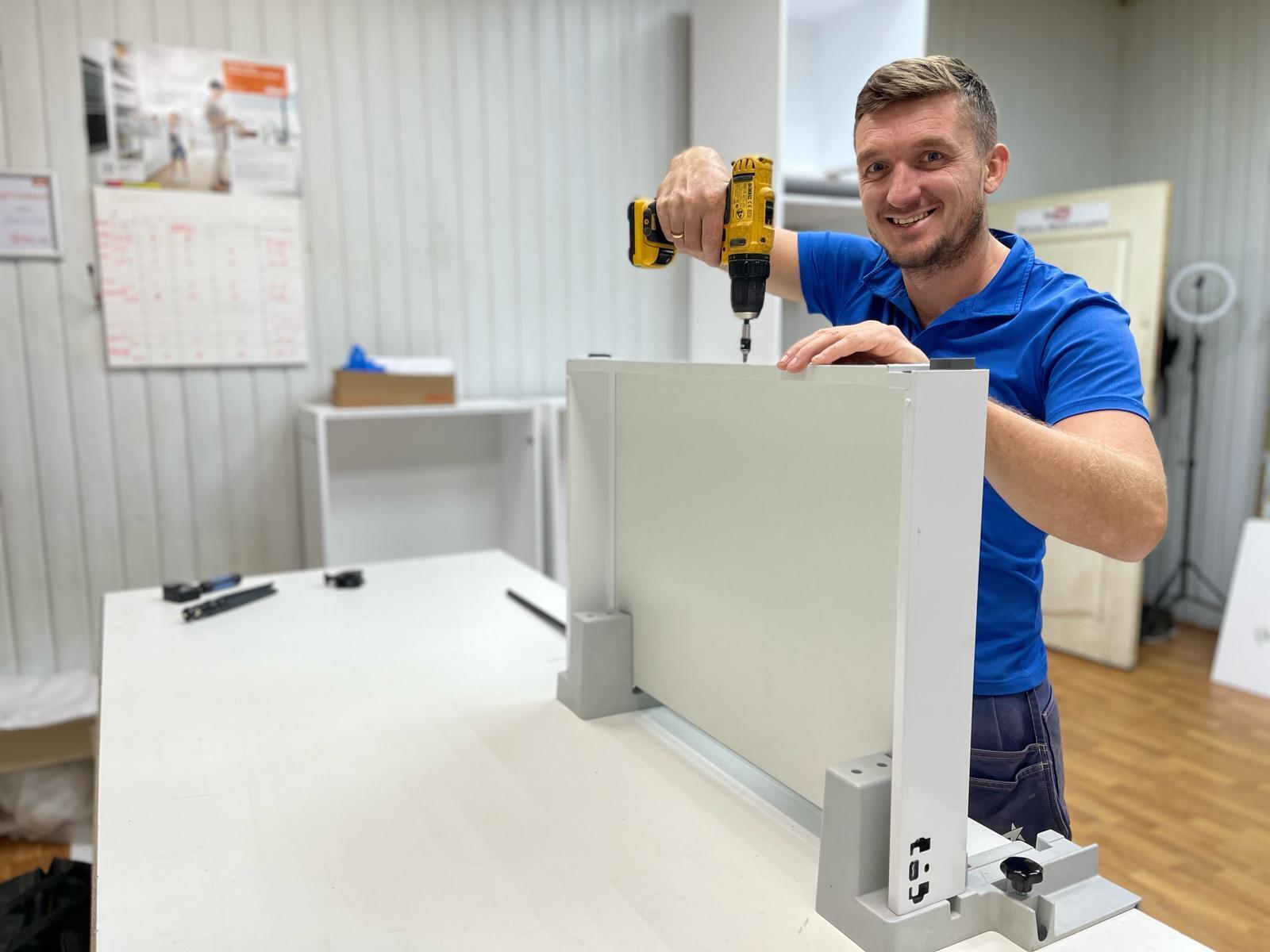
In a world of standardized solutions and mass production, the stories of craftsmen who journey from foundational construction work to pioneering custom furniture technologies stand out as especially valuable. Viktor Sobolevskyi—a talented expert in furniture manufacturing and design, and an entrepreneur who has brought unique technological innovations to the industry—is a shining example. His career is a testament to how hands-on experience, combined with engineering ingenuity and relentless pursuit of quality, can shape a true professional. Today, we speak with Viktor about his journey, principles, and vision for the future of furniture making.
Viktor, your career path from electrician and construction foreman to a recognized expert in furniture manufacturing and the creator of unique technologies is anything but ordinary. What sparked your interest in craftsmanship, and how did the transition happen after over a decade in construction?
I’ve always had a passion for working with my hands and creating something tangible—that’s been with me since childhood. My grandfather was a carpenter and builder, and I was introduced to the trade from a young age. So choosing a profession after school was a conscious decision, although with a twist—I studied to become a 4th-grade electrician at a vocational school (1999–2003), as it seemed more interesting than other construction specialties. After graduating, at around 19 years old, I moved to Kyiv and started working at a now-defunct construction company called “Europa Bud.” I began as a laborer, but within a year I became a team lead for electricians, and later, after switching companies, I managed general construction work as a foreman.
My shift to furniture making was largely forced—but in hindsight, it was fate. I developed a severe allergy to construction dust. Furniture production seemed cleaner and I was drawn to the meticulousness of the work. I began seriously studying the field, focusing on hands-on experience and gaining knowledge through various jobs.
How did you immerse yourself in the furniture world after changing industries? What unexpected value did your construction skills bring, and how did formal training—such as the Blum technology courses—complement your practical knowledge?
Joining the interior and design studio Cappuccino in 2016 was a turning point. A friend and former project collaborator, who was the director of the showroom, invited me to try a new role—and I agreed without hesitation. Learning the technology of Austrian hardware brand Blum was just part of the process. Simultaneously, I dove deep into studying all kinds of hardware and technical aspects. Within 2–3 months, I had mastered the basics and began working actively.
Eventually, I was appointed Head of Quality Control, overseeing the production, assembly, and installation of modular furniture—often participating personally. My construction background gave me something invaluable: a “cool head.” Staying calm, finding solutions under pressure, avoiding panic—these qualities are priceless. I know I can solve any problem, which turns work into a source of satisfaction, not stress. Real-world practice became my best teacher.
Your projects Vitroom and later your own startup Mebelshik.pro were major milestones. What inspired your move into entrepreneurship, and what was unique about the furniture assembly technology you developed for Mebelshik.pro, which allowed for record turnaround times—just one week from order to delivery?
Vitroom was a joint startup with a designer I met at Cappuccino—he handled design and sales, and I managed the technical and production side. The venture was promising, but we parted ways due to differences. That experience pushed me to start my own company—Mebelshik.pro. By then, I had built a solid reputation and strong supplier relationships, so the launch went relatively smoothly.
Our goal was to create a unique product. With my design partner—whom we trained from scratch—we developed a special modular furniture construction technology. The aim was to make assembly as intuitive as building with Lego. We spent about three years perfecting every detail so that furniture could be assembled in the workshop in a single day and installed on-site the next day. The standard turnaround from project approval to final delivery was just one week—phenomenally fast for custom furniture.
The system was so refined that even someone with no experience could assemble it. I even have a YouTube video showing my nine-year-old daughter successfully putting furniture together. We sold this furniture to clients in Europe and the U.S., who assembled it themselves using our blueprints and pre-packaged modules. Despite multiple requests, I haven’t sold the technology—it took too much time and effort to develop. My motto is “quality in the details,” even those the customer never sees.
Your YouTube channel Zhizn’ Mebelshchika (“Life of a Furniture Maker”), launched back in 2017, has attracted a solid audience—almost 50,000 subscribers and millions of views. What’s the mission behind it?
The idea for the channel came during my construction days, but I was hesitant to appear on camera back then. Once I transitioned into furniture making, I found more inspiration. I started modestly, felt shy on camera, but eventually found my rhythm. The goal of the channel is to share practical experience—showing production processes, assembly, installation, and offering product reviews.
I also do live streams, answer questions, and share insights. It’s a very niche channel, so growth is slower compared to entertainment content. I aim to provide thorough, in-depth information. Maybe that’s a drawback from a promotional standpoint—detailed answers leave less room for comments and discussion, which typically boost engagement. But I prefer a solid, knowledge-sharing approach. Besides YouTube, I also run a Telegram channel, primarily for professionals, where I maintain a purely industry-focused space—no politics.
Your move to the U.S. and role at Ucon since March 2024 marks a new chapter. What drove that decision, and how is your European experience and quality-first approach being received in the American market?
Closing Mebelshik.pro in December 2023 and leaving Ukraine was a tough but necessary decision. A subscriber from the U.S. helped me with the documents and relocation. At Ucon (www.ucon.us), I work as a Crew Leader. My duties include supervising furniture installers (I also take part), scheduling, procuring materials, and assembling exhibition displays. We're introducing European methods and quality standards to the U.S. market, and the response has been very positive.
Americans appreciate European design and quality, though the local market still has its quirks—and frankly, furniture quality here can sometimes be questionable.
You’ve mentioned your intention to start your own production in the U.S. How promising do you find the American market for a European approach to furniture, and what would signal the right time to launch your own venture?
I see huge potential here. European furniture is just starting to gain traction in the U.S.—we’re at the very beginning. The demand exists, and it’s growing. My current boss at Ucon isn’t yet ready to launch a production facility, though I’m encouraging him. If the company no longer offers room for growth—and I feel I’ve hit a ceiling in both role and pay, becoming one of the highest-earning employees in a short time—I will seriously consider starting my own business.
Here in the U.S., it’s easier than in Ukraine—especially financially. The government supports entrepreneurs, offers low-interest loans, and allows time for development without excessive pressure from regulatory bodies. So yes, I plan to realize what I aimed to do in Ukraine—scale up quality European furniture production, perhaps with my own showroom and a dedicated sales team, since my strength lies in the technical side. In San Diego, where I live, I don’t yet feel much competition in the high-quality European furniture segment.
Looking back on your journey, what core qualities do you believe are essential for success in furniture making? And what advice would you offer to those just starting out, possibly unsure about changing careers, as you once were?
First and foremost—honesty. With clients, and with yourself. Equally important is hard work. You must genuinely love what you do. If the work doesn’t bring joy, burnout is inevitable. I’ve been lucky—not to burn out in furniture making, because I truly enjoy it. Sure, there are moments of fatigue, but activities like snowboarding and diving help me recharge.
To young professionals, I’d say: don’t be afraid. Don’t fear learning. Don’t fear changing industries if you feel a calling. You can learn anything if you truly want to. I wasn’t afraid to switch from construction to furniture, even though the technical documentation was daunting at first. My desire to master something new helped me overcome every obstacle.
The most meaningful project of my career remains Mebelshik.pro—my brainchild, into which I poured a lot of heart. Though I had to close it, I believe this: if I built it once, I can do it again.







